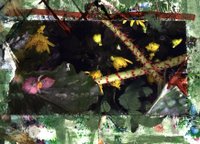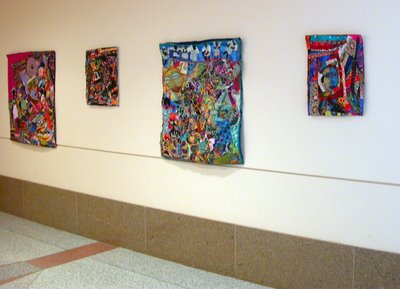Thursday, March 30, 2006
Wednesday, March 29, 2006
Tuesday, March 28, 2006
the last song Rodgers and Hammerstein wrote together
Edelweiss, Edelweiss
Every morning you greet me
Small and white, clean and bright
You look happy to meet me
Blossom of snow may you bloom and grow
Bloom and grow forever
Edelweiss, Edelweiss
Bless my homeland forever
This is a show we will exhibit at NIH on loan from Donna Glassford at Vanderbilt
 Story by David Glasgow
Story by David GlasgowPhotos by Jonathan Rodgers
Walking from a hilltop orphanage past grass roofs in small fishing villages along the Ugandan shore of Lake Victoria is bound to make a lasting impression on anyone used to Western comforts. On his most recent research trip to the region, assistant professor of musicology (ethnomusicology) Greg Barz felt a profound sadness surrounding the many empty houses that had once been home to laughing children. In sharp contrast, the members of the local women's performance group he was preparing to record were dressed in a rainbow of brightly colored dresses and excitedly invited everyone they passed to join them for the evening's performance. The dirt road carried the party down to a small fishing village in the area where many think the HIV virus first emerged.
Barz returned to the region last summer to demonstrate and document the link between the recent decline in Uganda's HIV infection rate and the grassroots efforts of these rural women's groups. He found that efforts based on traditional Western medical models have proven largely unsuccessful, inaccessible and expensive. "Only when supported and encouraged by performances that draw on local musical traditions have medical initiatives taken root in local health care systems," he said.
In the village, drums beat out an invitation to the locals returning from the day's labor in the fields. With no other promotion or advance work, such calls often are answered by more than 100 men, women and children from the network of small villages surrounding a particular venue. In a culture where the word for music, ngoma, includes singing, drumming, dance and drama, such traditional performances are as much about education as entertainment.
The complicated tenets of many faiths have long been made easier to remember through psalms, hymns and chant. From the "Alphabet Song" to "Schoolhouse Rock," the value of music as an educational tool is familiar to most Americans. Halfway around the world, Barz sees these women's groups literally "singing for life."
Aida Namulinda is a farmer and the leader of one of the 45 women's groups studied. While her group prepared for the performance, she explained to Barz, "No one will listen to us unless we bring our drums. No one will listen to us talk about Silimu (AIDS) unless we dance."
As the evening of music-making began, several men brought out kisoga xylophones, panpipes, tube fiddles and drums from one of the grass-roofed huts to accompany the ensemble. The women encouraged everyone gathered to dance, sing and listen to their very direct messages concerning proper condom use, faithfulness to partners, sexual abstinence and the virulence of HIV/AIDS.
During a break, Aida explained that music is now embraced by village-based groups such as hers as the most effective and immediate means available to educate the people of remote villages about medical and health care concerns. When the music resumed, she demonstrated her point through a series of songs dramatizing the ways that women can fight back against the spread of HIV and how they must reclaim their health and rebuild their lives even though they may have tested positive for the virus.
"We have a lot to learn from the Ugandan example," said Barz. "Too often, Western cultures deem catastrophic illness as rendering the victims helpless." Many of the HIV-positive women report that dancing energizes and singing gives them back more than it takes. "Rather than just being positive, the women we spoke to are choosing to live positively, helping others," said Barz.
"A lot of money flows into that part of the world because of the AIDS pandemic, but not a lot trickles all the way down to the local villages," Barz said. With little or no support from government or charitable agencies, these women now often turn to demonstratively more effective means of communicating information through traditional Ugandan culture using ngoma performances for the healing, counseling, care and education of their neighbors.
"The women are proving that one person can make a difference, without money, without outside support," said Barz.
In many ways Uganda is at the center of the HIV/AIDS pandemic in Africa. The nation has become a leader in the funding of research on the control and monitoring of fluctuations of infection rates. Testing, education, awareness and treatment have become national issues, with Uganda's President Yoweri Kaguta Museveni taking the lead in de-stigmatizing the disease by pronouncing AIDS an "open secret."
"They have separated the disease from sex and taken away the shame so people are willing to take care of others. This is a model for a more compassionate response," Barz said.
"In this regard, the country has dealt aggressively with HIV/AIDS to a much greater extent than other countries in Sub-Saharan Africa," said Barz. According to the latest figures from the U.S. Centers for Disease Control and Prevention, more than 400,000 people have died from the disease since it was first diagnosed in the country in 1984. It is estimated that another two million people are now infected with the virus. At one time, the figures represented approximately 30 percent of Uganda's total population.
While current infection rates are reported by the Ugandan gover nment to be below 8 percent, in many of the eastern villages it is estimated that one in four people is already infected. "The women in this region face a phenomenal risk of HIV infection and ultimately death from AIDS," said Barz.
"On many occasions, we asked the women living positively with HIV why they persist in their efforts, why they continue to dance when they have so little energy," said Barz. "The answers given remain profound for me. They do not want other women and children to experience what has been forced upon them, and they will use whatever power they can access to educate others, no matter how small the rewards," he said.
Barz found that women are often raising multiple generations of orphaned children at the same time they are faced with the reality that they must also plan the inevitable need for similar care and education for their own offspring.
As AIDS has devastated entire villages, women have joined other survivors to form what Barz describes as "indemnity groups" that take the place of extended families to provide financial, educational, spiritual and support networks. "Most rely on subsistence farming for food in the region naturally rich with bananas and cassava," said Barz. Fishing and cultivation of a diminishing coffee crop round out the majority of goods available for trade.
On previous trips to record and document the indigenous music of the region, Barz had found that women's music was considered to be more private than men's and was little studied. "It was unusual even to see a woman with a musical instrument," he explained.
"Ethnomusicology is concerned with understanding how things change: how music can be used in social action, even with no money in a small Ugandan village," said Barz. "The goal is to understand how others live in the world and to learn about ourselves in the process."
"There is a very fine line between studying something and changing it," warned Barz.
Traditionally, it has been the men who were sought out and recorded by visiting scientists. "So the act of recording these performances provides validation and attracts more attention for the messages the women are trying to convey," he explained. "I inadvertently affect change when my recording efforts showcase women's voices."
There is value to the medical community too. Doctors involved with HIV/AIDS medical research in the Ugandan capitol accompanied the Barz team to some of the villages.
Because of the social climate in these areas, men often reject or pay only lip service to prevention efforts. "In this region alone, there are over 50 different terms for HIV/AIDS," said Barz. "Music is a primary form of communication and education. Research that ignores these performances may miss key factors in the way the most vulnerable people make sense of this disease."
Imbedded in the texts of many songs are both direct and veiled references to issues and commonly held beliefs surrounding the HIV virus. "Many believe that the disease selects the body it wants to infect, deliberately choosing its victims," said Barz. "Another myth is that if an HIV positive man sleeps with six women, only the sixth will become infected; the other five are thought to be safe."
Sexual abstinence and the practice of "zero grazing," or faithfulness to one's partner or partners, are radical ideas in a society where polygamy is widely accepted and practiced. "You know, these men that we live with, they cannot do without sex," said Aida. "For men, sex is a natural biological act; they feel it is something God given."
By singing about issues like the need for blood tests, Aida and other women feel they gain strength and fight the spread of the deadly virus.
In addition to field research Barz teaches courses on jazz, world music and African music and religion. He plans to return to Uganda in the summer of 2002 to follow up and confirm the link between the recent decline in Uganda's infection rate and the grassroots efforts of local groups like Aida's.
Katja Oxman

I recently presented Katja's artwork for a project I'm working on at NIH, she creates rich, complicated, intricate color etchings. You can see her work at Steven Scott Gallery here
Monday, March 27, 2006
William Carlos Williams poem
The descent beckons
as the ascent beckoned.
Memory is a kind
of accomplishment,
a sort of renewal
even
an initiation, since the spaces it opens are new places
inhabited by hordes
heretofore unrealized,
of new kinds--
since their movements
are toward new objectives
(even though formerly they were abandoned).
No defeat is made up entirely of defeat-since
the world it opens is always a place
formerly
unsuspected. A
world lost,
a world unsuspected,
beckons to new places
and no whiteness (lost) is so white as the memory
of whiteness .
With evening, love wakens
though its shadows
which are alive by reason
of the sun shining-
grow sleepy now & drop away
from desire.
Love without shadows stirs now
beginning to awaken
as night
advances.
The descent
made up of despairs
and without accomplishment
realizes a new awakening:
which is a reversal
of despair.
For what we cannot accomplish, what
is denied to love,
what we have lost in the anticipation-
a descent follows,
endless and indestructable .
as the ascent beckoned.
Memory is a kind
of accomplishment,
a sort of renewal
even
an initiation, since the spaces it opens are new places
inhabited by hordes
heretofore unrealized,
of new kinds--
since their movements
are toward new objectives
(even though formerly they were abandoned).
No defeat is made up entirely of defeat-since
the world it opens is always a place
formerly
unsuspected. A
world lost,
a world unsuspected,
beckons to new places
and no whiteness (lost) is so white as the memory
of whiteness .
With evening, love wakens
though its shadows
which are alive by reason
of the sun shining-
grow sleepy now & drop away
from desire.
Love without shadows stirs now
beginning to awaken
as night
advances.
The descent
made up of despairs
and without accomplishment
realizes a new awakening:
which is a reversal
of despair.
For what we cannot accomplish, what
is denied to love,
what we have lost in the anticipation-
a descent follows,
endless and indestructable .
Sunday, March 26, 2006
Saturday, March 25, 2006
Friday, March 24, 2006
Tuesday, March 21, 2006
Monday, March 20, 2006
Sunday, March 19, 2006
Saturday, March 18, 2006
Friday, March 17, 2006
Thursday, March 16, 2006
Wednesday, March 15, 2006
Monday, March 13, 2006
Sunday, March 12, 2006
Friday, March 10, 2006
Thursday, March 09, 2006
Wednesday, March 08, 2006
Sunday, March 05, 2006
Saturday, March 04, 2006
Friday, March 03, 2006
Wednesday, March 01, 2006
Hsin Hsi Chen

Hsin-Hsi Chen's StatementThe riddled paths in our lives combine the reality and imaginary world. These broken bits link to each other and complete us in some ways. The untouchable and invisible time and space overlap the inner light of human, which allude to the unpredictable challenges and growth. Illusion annexes and extracts the thoughts into the real world. Those elements in the universe are expanding the unspeakable but fascinating messages. I am devoted to unfold my view of life and seek the balance between the existence and illusion through my artwork. web site here








































